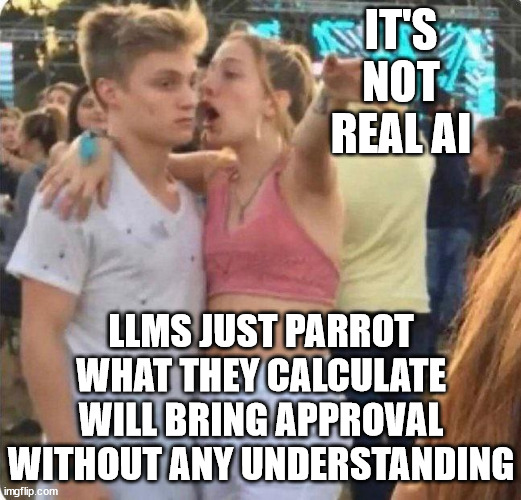this post was submitted on 05 Feb 2024
662 points (88.2% liked)
Memes
49392 readers
1343 users here now
Rules:
- Be civil and nice.
- Try not to excessively repost, as a rule of thumb, wait at least 2 months to do it if you have to.
founded 6 years ago
MODERATORS
you are viewing a single comment's thread
view the rest of the comments
view the rest of the comments

True it's speculation. But before GPT3 I never imagined AI achieving creativity. No idea how you would do it and I would have said it's a hard problem or like magic, and poof now it's a reality. A huge leap in quality driven just by quantity of data and computing. Which was shocking that it's "so simple" at least in this case.
So that should tell us something. We don't understand the brain but maybe there isn't much to understand. The biocomputing hardware is relatively clear how it works and it's all made out of the same stuff. So it stands to reason that the other parts or function of a brain might also be replicated in similar ways.
Or maybe not. Or we might need a completely different way to organize and train other functions of a mind. Or it might take a much larger increase in speed and memory.
You say maybe there's not much to understand about the brain but I entirely disagree, it's the most complex object in the known universe and we haven't discovered all of it's secrets yet.
Generating pictures from a vast database of training material is nowhere near comparable.
Ok, again I'm just speculating so I'm not trying to argue. But it's possible that there are no "mysteries of the brain", that it's just irreducible complexity. That it's just due to the functionality of the synapses and the organization of the number of connections and weights in the brain? Then the brain is like a computer you put a program in. The magic happens with how it's organized.
And yeah we don't know how that exactly works for the human brain, but maybe it's fundamentally unknowable. Maybe there is never going to be a language to describe human consciousness because it's entirely born out of the complexity of a shit ton of simple things and there is no "rhyme or reason" if you try to understand it. Maybe the closest we get are the models psychology creates.
Then there is fundamentally no difference between painting based on a "vast database of training material" in a human mind and a computer AI. Currently AI generated images is a bit limited in creativity and it's mediocre but it's there.
Then it would logically follow that all the other functions of a human brain are similarly "possible" if we train it right and add enough computing power and memory. Without ever knowing the secrets of the human brain. I'd expect the truth somewhere in the middle of those two perspectives.
Another argument in favor of this would be that the human brain evolved through evolution, through random change that was filtered (at least if you do not believe in intelligent design). That means there is no clever organizational structure or something underlying the brain. Just change, test, filter, reproduce. The worst, most complex spaghetti code in the universe. Code written by a moron that can't be understood. But that means it should also be reproducible by similar means.
Possible, yes. It's also entirely possible there's interactions we are yet to discover.
I wouldn't claim it's unknowable. Just that there's little evidence so far to suggest any form of sentience could arise from current machine learning models.
That hypothesis is not verifiable at present as we don't know the ins and outs of how consciousness arises.
Lots of things are possible, we use the scientific method to test them not speculative logical arguments.
These would need to be defined.
Can't be sure of this... For example, what if quantum interactions are involved in brain activity? How does the grey matter in the brain affect the functioning of neurons? How do the heart/gut affect things? Do cells which aren't neurons provide any input? Does some aspect of consciousness arise from the very material the brain is made of?
As far as I know all the above are open questions and I'm sure there are many more. But the point is we can't suggest there is actually rudimentary consciousness in neural networks until we have pinned it down in living things first.